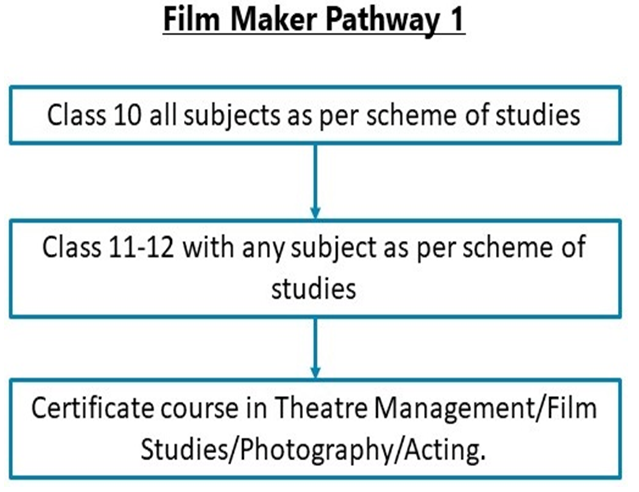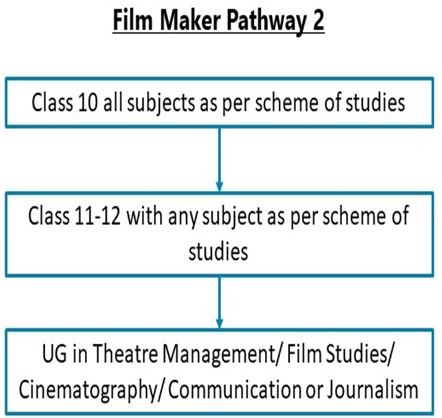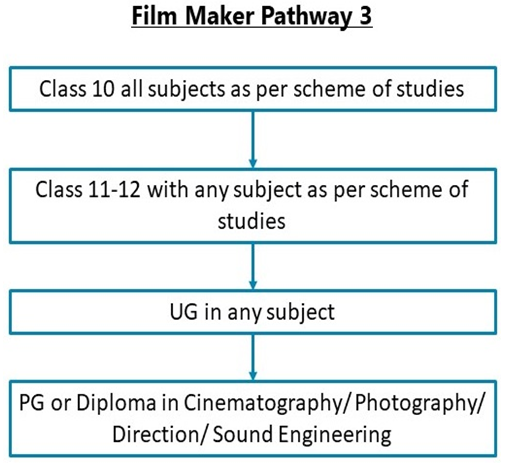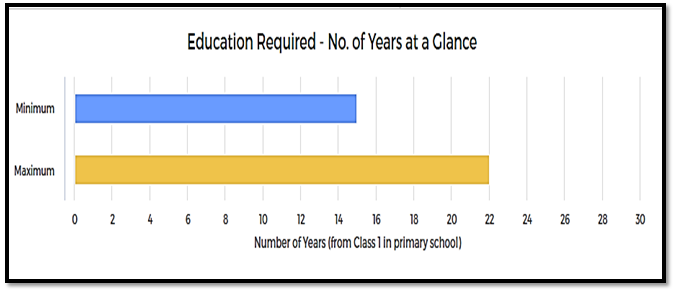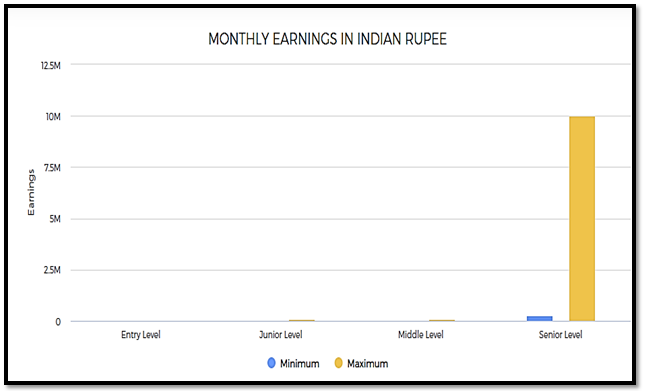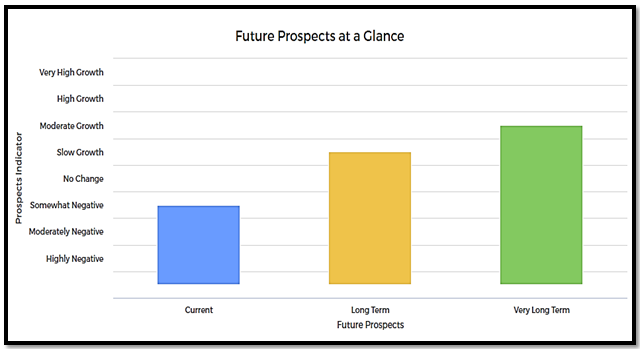Film Maker
Entry Level Qualification
12
Career Fields
Mass Media, Journalism & Entertainment, Mechanic & Technician
For Specially Abled






Career Entrance Exam
About Career
1. A filmmaker oversees the shooting of the screenplay of a movie (feature film or short film) while directing and controlling the entire process (from scriptwriting and pre-production to shooting and post-production) and guiding the other team members such as actors, cinematographers, screenwriters etc. As a filmmaker, you will coordinate the creative skills of the personnel and derive the best from them. You will think the creative ideas to interpret the script in an entertaining and effective way that must be understandable to the audience.
2. As a filmmaker or director, you will be in charge of all activities while making a film. You will design the whole film and its scenes by shooting at various places according to the script. You may either write your own story or may coordinate with another writer. You will give directions to the actors/actress and decide their role. While you will handle the creative work but sometimes you will be required to perform the other functions too such as managing financial matters, writing the screenplays, editing the videos and stories etc. and play the technical role while working with sound engineers, technicians, checking the lighting, graphics etc.
3. If you are into digital film making, then you will be working to create a film digitally. While some part of the film may require shooting, most of the sections of the film will come through computer generated effects commonly known as VFX. Here, too you will play the same part of visualizing each scene and explaining it to the team so that they can develop them.
Key Roles And Responsibilities:
As a filmmaker, you will be required to fulfil the following roles and responsibilities.
1. As a director, you will choose all the members working for a movie such as cast members, production designers, technicians, photographers, cinematographers, etc., and give direction to them related to all creative and technical work.
2. You will take the auditions for the selection of an actor/actress who will fit in the role of the character.
3. You will coordinate with each team member such as writers, editors, costume designers, producers, musicians, camera persons, photographers, etc.
4. You will be responsible for developing, shooting and marketing the movie.
5. You will read and interpret the scripts and provide feedback to the writers for further changes in the script.
6. As a director, you will monitor the progress of actors and motivate them to derive their best performances.
7. You will research and identify the various locations to shoot the scenes.
8. Sometimes, you will be required to make editing in the script and shooting scenes to make it in a final form.
9. You will oversee the rehearsals on the set and monitor the progress in the production of the film.
10. You will prepare and calculate the budget and raise finance for the production work.
11. You will hire the musicians and composers to decide the musical track for the film.
12. It is the responsibility of a director to not show any offence or unsocial matter in the film for the sake of entertainment which may not be desirable to the audience.
13. If you are a digital filmmaker, then you will explain each scene to your creative team so that they can create these scenes through VFX.
PARTICULARS | DESCRIPTION |
Name | Film Maker |
Purpose | Responsible for Developing, shooting and Marketing |
Career Field | Mass Media, Journalism & Entertainment |
Required Entrance Exam | No Entrance Exam |
Average Salary | 60000 - 300000 Rs. Per Year |
Companies For You | Yash Raj Films, Madras Talkies, AVM Production & Many More |
Who is Eligible | Graduate |
Career Entry Pathway
Class 10 all subjects as per scheme of studies - Class 11-12 with any subject as per scheme of studies – Certificate course in Theatre Management/Film Studies/Photography/Acting.
After your Class 10 all subjects as per scheme of studies, you can study Class 11-12 with any subject as per scheme of studies. If you have a keen interest in film making, then you can do a certificate course in Theatre Management/ Film Studies/ Photography/ Acting, etc. to start at a lower level. From here you can move to theatres as a director, actor, photographer, manager, etc. However, it must be noted that you can become a filmmaker without any minimum or mandatory qualification provided you must have creative and technical skills.
Class 10 all subjects as per scheme of studies - Class 11-12 with any subject as per scheme of studies – UG in Theatre Management/ Film Studies/ Cinematography/ Communication or Journalism.
After your Class 10 all subjects as per scheme of studies, you can study Class 11-12 with any subject as per scheme of studies. After that study for a bachelor’s degree in Theatre Management/ Film Studies/ Cinematography/ Communication or Journalism. However, it must be noted that you can become a filmmaker without any minimum or mandatory qualification provided you must have creative and technical skills.
Class 10 all subjects as per scheme of studies - Class 11-12 with any subject as per scheme of studies – UG in any subject – PG or Diploma in Cinematography/ Photography/ Direction/ Sound Engineering.
After your Class 10 all subjects as per scheme of studies, you can study Class 11-12 with any subject as per scheme of studies. After that study for a bachelor’s degree in any subject. Then you can study for a Master’s degree or Post Graduate Diploma course in Cinematography/ Photography/ Direction / Sound Engineering. However, it must be noted that you can become a filmmaker without any minimum or mandatory qualification provided you must have creative and technical skills.
Class 10 all subjects as per scheme of studies - Class 11-12 with any subject as per scheme of studies – UG in Theatre Management/ Film Studies/ Cinematography/ Communication or Journalism – PG or Diploma in Cinematography/ Photography/ Direction/ Sound Engineering.
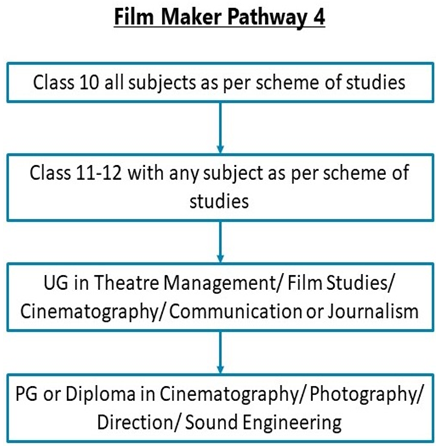
After your Class 10 all subjects as per scheme of studies, you can study Class 11-12 with any subject as per scheme of studies. After that study for a bachelor’s degree in Theatre Management/ Film Studies/ Cinematography/ Communication or Journalism/ Photography/ similar subject. Then you can study for a Master’s degree or Post Graduate Diploma course in Cinematography/ Photography/ Direction / Sound Engineering. While these post-graduation courses can be done with any course at graduation level, but with similar graduation courses are more helpful. However, it must be noted that you can become a filmmaker without any minimum or mandatory qualification provided you must have creative and technical skills.
Required Qualification & Competencies
To become a film maker, you can do a Bachelor’s or Post Graduate Degree or a Diploma in any of the following fields:
1. Film and Television Direction
2. Film and Television Production
3. Film and Television Studies
4. Film and Video Editing
5. Film Design & Technology
6. Film and Video Design and Communication
MINIMUM EDUCATION REQUIRED | MAXIMUM EDUCATION REQUIRED |
Under Graduate Undergraduate Degree / Honours Diploma / Graduate Diploma (equivalent to a Degree) Programs for which the minimum eligibility is a pass in Higher Secondary / Class XII School Leaving examination. | Doctoral All Ph.D. or equivalent degree programs for which the minimum eligibility is a Postgraduate or a Pre-Doctoral degree. |
Competencies Required
Interests
1. Artistic: You should have interests for Artistic Occupations. Artistic occupations mostly involve working with creative ideas, art and designs. These occupations involve abstract or conceptual thinking, creative self-expression and often do not follow any set processes or rules for getting things done.
2. Enterprising: You should have interests for Enterprising Occupations. Enterprising occupations involve taking initiatives, initiating actions, and planning to achieve goals, often business goals. These involve gathering resources and leading people to get things done. These require decision making, risk taking and action orientation.
Abilities
1. Abstract Reasoning: The ability to understand ideas which are not expressed in words or numbers; the ability to understand concepts which are not clearly expressed verbally or otherwise.
2. Emotional Intelligence: The ability to understand your own and others' emotions and feelings; empathy for others; adjusting your behaviour or self-control and self-regulation according to others' emptions and situations.
3. Fluency of Ideas: The ability to come up with a number of ideas about a topic (the number of ideas is important, not their quality, correctness, or creativity).
4. Originality: The ability to come up with unusual or innovative ideas about a given topic or situation, or to develop creative ways to solve a problem.
5. Selective Attention: The ability to concentrate on a task over a long period of time without being distracted.
Knowledge
1. Performing Arts: Knowledge about the theories and techniques required for producing various works of performing arts such as music, dance, drama, theatre, film, television series, etc.
Skills
1. Active Listening: Giving full attention to what other people are saying, understanding the points being made by others, asking questions, etc.
2. Directing: Skills in directing others' actions to get things done.
3. Filmmaking: Skills in directing, producing, and otherwise making films.
4. Judgment and Decision Making: Skills in considering pros and cons of various decision alternatives; considering costs and benefits; taking appropriate and suitable decisions.
Personality
1. You are always or mostly a soft-hearted person.
2. You are always imaginative or in most situations.
3. You always prefer to experience new things and have new experiences or you mostly do.
4. You can always act independently or could do so in most situations.
5. You trust others sometimes but not always.
6. You are helpful to others sometimes.
7. You are mostly impulsive in your action and behavior.
Career - Job Opportunities & Profiles
1. As a filmmaker, you can start your career by getting training as an assistant director. Some filmmakers also start as actor, writers, cinematographers while learning the working environment.
2. You can be hired as a digital sound engineer, content producer, graphic designer, technical consultant, or editor, at an entry-level.
3. You might get opportunities by working for different languages feature films (like Bollywood), or short films, or TV series, or digital films, animation films, or theatre, etc.
Work Environment
The filmmaker is involved in every stage of film production, so you must be ready to work for long hours. There will be no fixed timelines. You will be required to work at any time of the day such as night, weekends and even on holidays as per the requirement of the script. This is a very creative and technical job where you must an extra effort. Sometimes, you will work in severe weather conditions, unpleasant locations etc. while travelling to different places. As a filmmaker, you must be ready to face pressure during the work to finish assignments on time.
Specialisation tracks in This Career
1. Director (Feature Film)
Feature films are generally based on fictional stories which are made in a theatrical or dramatic style. Feature films could also be made on the basis of real life incidents or on a famous person's life (biopics). But in all cases, there is dramatization of a certain degree.
2. Director (Documentary Film)
Documentary films are generally based on non-fictional real-life stories or incidents or on the work of a person or on the life of a person. Documentary films are mostly made to inform or educate.
3. Digital Film Maker
As a digital filmmaker, you will make a film by using different modern techniques and processes. You will use the latest technology to make a film such as software, digital cameras with high megapixels, computers, storage devices, etc. to create better visions and sound qualities. You will create computerized characters and backgrounds to create 3D visuals.
4. Director (Commercial Film)
Commercial films are shot to advertise a product or service to communicate and influence sales of the products and services.
Career Growth
The career growth in this field totally depends on your creative skill and the experience you have gained. With many years of experience, you can become a Producer, Director, Scriptwriter, and Technical Head. The positions remain the same but you will grow in your skills and knowledge. Sometimes you will move from a small or independent studio to big studios like Yash Raj Films
Salary Offered
1. At the start of the career with no work experience, most of you will join as a trainee assistant director and might be just compensated for your travel and food. Some reputed film houses may pay you a stipend of Rs. 5,000 to 25,000 per month. Similarly, for other roles like Cinematographer, Photographer, etc. you will be paid nothing to Rs. 25,000 per month at the start of your career.
2. With a work experience of 2-6 years, you might earn up to Rs. 2,00,000 per month if you are a cinematographer, photographer, screenwriter, scriptwriter, etc. If you are in this direction, then you might earn from Rs. 50,000 per month to 1,00,00,000 per month (based on the studio you work in and the box office collection of your last movie).
3. While, these cinematographers, photographers, etc. continue to draw more salary with experience and time, directors and scriptwriters earn more based on the success of their previous movies. So, while some may earn less even in more time, some earn in crores just after one successful movie.
Monthly Earning In Indian Rupee
Entry Level | Junior Level | Mid Level | Senior Level | |||||
Min Earning | Max Earning | Min Earning | Max Earning | Min Earning | Max Earning | Min Earning | Max Earning | |
5000 | 25000 | 45000 | 80000 | 50000 | 100000 | 250000 | 10000000 | |
1. Entry level: 0 - 2 years of work experience
2. Junior Level: From 1 to 12 years of work experience
3. Mid-Level: From 5 to 20+ years of work experience
4. Senior Level: From 10 to 25+ years of work experience (there could be exceptions in some high-end technical, financial, engineering, creative, management, sports, and other careers; also in the near future, people will reach these levels much faster in many careers and in some careers, these levels will have no meaning as those careers will be completely tech skill driven such as even now, there is almost no level in a Cyber Security Expert’s job)
Work Activities
1. Communicating with co-workers and others: Communicating with people in writing, verbally or otherwise inside your workplace and various other people who have professional relationships with your place of work including vendors, government officials, etc. or with people at large.
2. Creative thinking: Developing new ideas, concepts, innovative solutions to problems, newer ways of getting things done, designing products and services, creating work of art and craft, etc.
3. Decision making and problem solving: Analysis of data and information; evaluation of alternative decisions and results of decisions; taking the right decisions and solving problems.
4. Getting Information and learning: Observing, hearing, reading, using computers, or otherwise obtaining information and learning from it.
5. Leading: Inspiring and motivating co-workers to work to achieve specific goals; enabling and facilitating others to perform tasks effectively; addressing issues and solving problems in order to help people perform well.
6. Organising, planning and prioritising tasks: Planning and organising tasks in order to achieve work goals; prioritising tasks to achieve goals and making the best use of the time available.
7. Performing for people: Performing various tasks for people to entertain them, help them, and assist them.
8. Rendering music: Singing, playing various musical instruments.
Future Prospects
The entertainment industry is expected to grow 10% by 2026 which is higher than the average rate of other occupations. There is an increasing popularity of movies and cinema among the people which will increase the future demand for filmmakers. Though if you a strong background in digital film making then there will be many opportunities for you. Half of the population spend their time while watching series, movies, serials etc. in their free time and rapidly growing usage of 3G and 4G along with the industrial growth in television and AVG segments, this all makes the bright future for the filmmakers and other artists. Netflix, Amazon Prime, Balaji, Zee5, etc. are few of the online platforms producing far more content then Bollywood.
Future Prospects At A Glance
Current (0-1 year) | Long Term (2-5 year) | Very Long Term (6-10 years) |
Somewhat Negative | Slow Growth | Moderate Growth |

